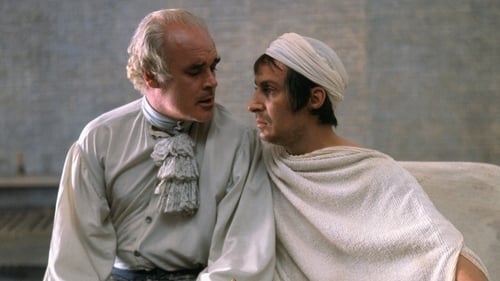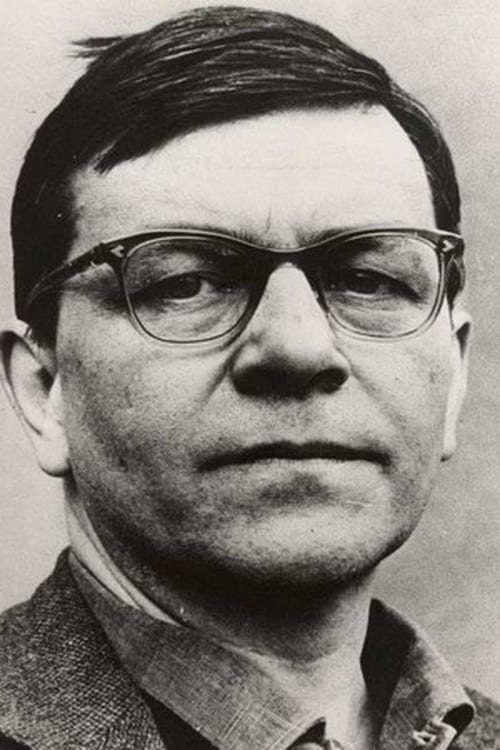Peter Weiss
Birth : 1916-11-08, Nowawes, Berlin, Germany
Death : 1982-05-10
History
Peter Ulrich Weiss was a German writer, painter, graphic artist, and experimental filmmaker of adopted Swedish nationality. He is particularly known for his plays Marat/Sade and The Investigation and his novel "The Aesthetics of Resistance".

Himself - Playwright
A Jewish Holocaust survivor travels through Germany recalling scenes from his memory.

Original Story
In Charenton Asylum, the Marquis de Sade directs a play about Jean Paul Marat's death, using the patients as actors. Based on 'The Persecution and Assassination of Jean-Paul Marat as Performed by the Inmates of the Asylum of Charenton Under the Direction of the Marquis de Sade', a 1963 play by Peter Weiss.

Writer

Madame's lover
24 hours in the life of three Swedish girls in Paris. Seduced by the excitement but short of money they earn a few francs as nude models in an art school.

Editor
24 hours in the life of three Swedish girls in Paris. Seduced by the excitement but short of money they earn a few francs as nude models in an art school.

Writer
The immense population increase in Copenhagen mid of the 20th century requested new living space further from the city centre. The old town quarters of the danish capital offered neither enough space nor did they provide a life close to nature which was required especially by families with many children. Based on the so called „finger plan” from 1947 Copenhagen was enlarged along five radial traffic axes. Using the example of the estates Carlsrø in Rodøvre and Milestedet in Brøndbyøster "Bag de ens facader" documents life in a modern suburb.

Director
The immense population increase in Copenhagen mid of the 20th century requested new living space further from the city centre. The old town quarters of the danish capital offered neither enough space nor did they provide a life close to nature which was required especially by families with many children. Based on the so called „finger plan” from 1947 Copenhagen was enlarged along five radial traffic axes. Using the example of the estates Carlsrø in Rodøvre and Milestedet in Brøndbyøster "Bag de ens facader" documents life in a modern suburb.

Director
Short film.

Director
A documentary film about the 99 year old artist Anna Casparsson. She is interviewed by Peter Weiss in her home in Saltsjöbaden. “I shot 'Anna Casparsson' together with Staffan Lamm. I had wanted to complete the film, but somehow I did not get around to it and then she died shortly afterwards.” -Peter Weiss

Author
A young man comes to Stockholm, Sweden and experiences several bizarre and surrealistic situations.

Director
A young man comes to Stockholm, Sweden and experiences several bizarre and surrealistic situations.

Editor
Deals with young people dealing and using drugs of all kind.

Writer
Deals with young people dealing and using drugs of all kind.

Director
Deals with young people dealing and using drugs of all kind.

Editor
Film by Peter Weiss.

Writer
Film by Peter Weiss.

Director
Film by Peter Weiss.

Director
A film about the youth prison in Uppsala, which focuses on one interns alienation and anxiety.

Writer
A film about the youth prison in Uppsala, which focuses on one interns alienation and anxiety.

Director
Surrealistic images of Faust-Mephisto in his fantastic laboratory.

Director
Experimental survey of down-and-outs in the city. - BFI

Editor
Experimental survey of down-and-outs in the city. - BFI

Editor
Study V: Interplay is constructed along the same principles as Study IV / Hallucinations. Sequences of photographic abstractions have been balanced against more realistic sections. Study V depicts a surrealistically charged encounter between two lovers, a young woman and a man.

Writer
Study V: Interplay is constructed along the same principles as Study IV / Hallucinations. Sequences of photographic abstractions have been balanced against more realistic sections. Study V depicts a surrealistically charged encounter between two lovers, a young woman and a man.

Director
Study V: Interplay is constructed along the same principles as Study IV / Hallucinations. Sequences of photographic abstractions have been balanced against more realistic sections. Study V depicts a surrealistically charged encounter between two lovers, a young woman and a man.

Editor
'Studie IV' (1955) by Peter Weiss portrays a liberation process. The main character moves between different rooms, rooms of significance for him, dragging something that constantly changes form but eventually turns out to be himself. It is an old and consumed I that disappears from him.

Writer
'Studie IV' (1955) by Peter Weiss portrays a liberation process. The main character moves between different rooms, rooms of significance for him, dragging something that constantly changes form but eventually turns out to be himself. It is an old and consumed I that disappears from him.

Director
'Studie IV' (1955) by Peter Weiss portrays a liberation process. The main character moves between different rooms, rooms of significance for him, dragging something that constantly changes form but eventually turns out to be himself. It is an old and consumed I that disappears from him.

Experimental short by Peter Weiss.

Editor
Experimental short by Peter Weiss.

Writer
Experimental short by Peter Weiss.

Director
Experimental short by Peter Weiss.

Writer
"Studie II (Hallucinationer)" (Study II (Hallucinations)) (1952), comprises twelve staged scenes that were modelled after a set of drawings. Accompanied by metallic sounds, various body parts, limbs and objects form surrealistic collages against the background of a black space. Peter Weiss intended to create associative images that can not be deciphered completely. Beyond any logical interpretation, he wanted to show pure inner feelings.

"Studie II (Hallucinationer)" (Study II (Hallucinations)) (1952), comprises twelve staged scenes that were modelled after a set of drawings. Accompanied by metallic sounds, various body parts, limbs and objects form surrealistic collages against the background of a black space. Peter Weiss intended to create associative images that can not be deciphered completely. Beyond any logical interpretation, he wanted to show pure inner feelings.

Director
"Studie II (Hallucinationer)" (Study II (Hallucinations)) (1952), comprises twelve staged scenes that were modelled after a set of drawings. Accompanied by metallic sounds, various body parts, limbs and objects form surrealistic collages against the background of a black space. Peter Weiss intended to create associative images that can not be deciphered completely. Beyond any logical interpretation, he wanted to show pure inner feelings.

Editor
First experimental film by Peter Weiss.

First experimental film by Peter Weiss.

Writer
First experimental film by Peter Weiss.

Director
First experimental film by Peter Weiss.



